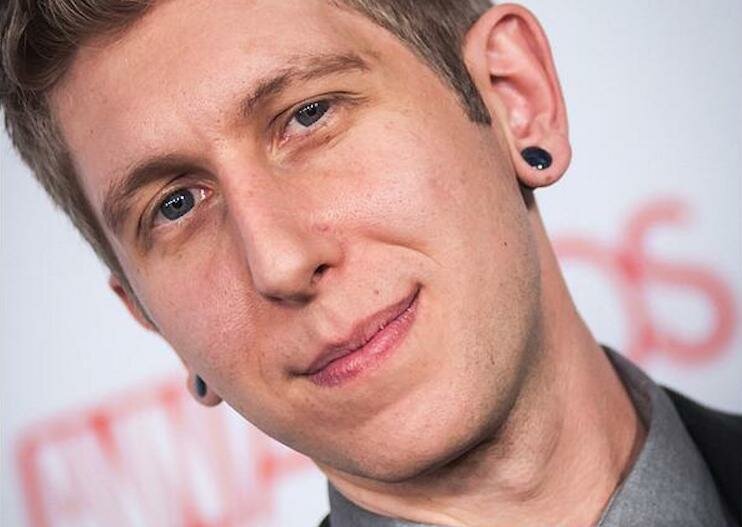
I’ve been working in porn for eight years, and for eight years, I’ve been defending it. First, it was from friends and family. Maybe I didn’t care about the industry itself, but I defended myself as a part of it. I didn’t want those closest to me to believe I was a fuck-up while I was fucking for a living.
In most ways, I wasn’t. I used porn to help pay my way through college, and I stuck with it long enough to earn myself a legitimate career.
Porn became important to me over time. I involved myself in the politics, befriended my colleagues, and became entrenched in the feedback loop that made me feel like I was doing something with my life. Porn gave me a sense of purpose. So I defended it some more.
I stood up for our productions, our health practices, and our rights as performers to use our bodies to make a living.
Then, one day, I was forced out of it. Well, at least the fucking part. My frequent use of performance-enhancing, erectile dysfunction drugs landed me in the hospital. A doctor’s orders meant that I could never have sex — professionally — again. It wasn’t the end of the world, but my career was over. Just like that.
My change in circumstances required a re-evaluation of what I stood for, and why. There was no way I could turn my back on the industry. However, I’d witnessed a deterioration in the rewards of my career at a time when the risks seemed greater than ever before. My experience gave me the utmost respect for those who braved the life of a performer. But I could no longer be a steadfast advocate for much of XXX industry practice.
I still receive calls because my defense is still out there for anyone to read; my words line the articles of blogs and sex-positive websites. So when bad shit happens in porn, there’s always a reporter to come snooping for my side of the story. In December 2013, I talked to a few such reporters. Porn was in the midst of its third production moratorium of the year due to a performer testing positive for HIV. The news needed its sources.
“What’s your take on this HIV scare?” one reporter asked me.
“First off, I should note that I’m no longer a performer. I quit about two months ago.”
“Why is that?”
I told him the truth: It had to do with my use of ED drugs.
“Do you think that’s another example of the industry’s lack of concern for performer health?” he asked.
“It’s kind of irrelevant. No producer asked me to take the drugs.” It was just what most guys did to get through scenes. “And I don’t think the industry has a lack of concern for performer health.” That was my defense — a knee-jerk reaction to the type of loaded question I was used to. I told the reporter that we tested for sexually transmitted infections (STIs) in porn, that our panel had expanded, and that we’d gone from testing every 30 days to once every two weeks. “It’s not even the law,” I said. “The industry does this on its own.”
Another reporter asked me, “Who takes on the costs of these tests?”
“They’re mildly subsidized by larger production companies, but it’s mostly performers.” I told her the current price, something like $175 per test, depending on the clinic.
“Wow. That’s quite the overhead.”
“Yeah,” I said. “It sucks. Especially for performers who don’t work often.”
She pulled more information from me: that there are no unions, no performer residuals, and basically zero resources for those who are sick, injured, or otherwise in need.
“But look at something like independent film,” I said. “I’ve worked on projects for terrible day rates, with no promise of residuals, and no access to benefits like healthcare.” My point was basically, “Why pick on porn?” I’ve found this is often part of my defense. I explain how terrible jobs are in general, and that there’s at least some money left in porn: Leave us alone to earn the last of it!
Given my generally leftist ideology, it’s a strange argument. I’d never drop my critique of other corporate workforce exploitations based on the fact that they’re “typical.”
Prior to the 2012 U.S. election, I voiced my defense against the County of Los Angeles Safer Sex in the Adult Industry Act, otherwise known as Measure B. The measure would require all Los Angeles County-based adult productions to implement barrier protection (i.e., condoms) on set. The adult industry launched a political campaign based around “performer choice”—as if all “straight” performers actively chose not to wear condoms (most gay porn productions require condoms, but not testing). The real truth was that production companies claimed their sales would plummet if they were forced to put condoms in their films; they said it would destroy the fantasy for the consumer.
I bought into the argument because I saw the lengths companies were going to in their fight for bareback sex. When Measure B passed, the industry split into factions. Some fought the law in court, others ignored it, and some moved their productions out of county and state. As a performer, I didn’t want to jeopardize my livelihood. If production companies couldn’t make money, it meant that I couldn’t either. I wanted them to be able to reap the largest profits possible so that I could too.
In retrospect, my argument seems awash in trickle-down economics. “If the production companies maintain their profits, the rest of us will make out okay.” This line of thought has proved disastrous for large-scale capitalism. The rich get richer and the general economy suffers. It’s just hard to figure out if porn is big business or a bunch of small-time radicals screaming, “Fuck the man.”
An editor from an adult magazine told me that she found the anarchistic nature of porn appealing. “It’s crazy that a legitimate business can exist in Los Angeles and basically ignore legislation,” she said. I agreed with her—sort of. There are pieces of libertarianism that I can get on board with, namely the movement against bureaucratic interference in small business. Most of the producers I know are small-time, independent contractors. They work constantly to earn their middle-class incomes. Some struggle month-to-month, just like the average performer. If all adult industry professionals are in the same boat, it makes sense to do what we have to in order to keep afloat. We come up with a set of rules (like testing and mutual responsibility) and abide by them because we know they’re necessary to survive.
Several years ago, I had a friend make the claim that porn was becoming an artisanal culture. Independent websites and online stores that sell individual video clips were allowing every performer to start their own business. Friends traded services and often shared content. Or they made deals like, “I do a scene for you, and you do a scene for me. So we each walk away with something exclusive.” This is still common form. But I’m no longer sure that porn is the small, collectivist community I believed it to be. The business model is changing to resemble less admirable portions of corporate America. It’s been financially disrupted like most every other entertainment industry. And the companies rising to the top are the same that help nail the coffin for everyone else.
For example, the international corporation MindGeek (formerly known as Manwin) now owns industry heavyweights Brazzers, Digital Playground, Mofos, MyDirtyHobby, Twistys, and Men.com. It’s also responsible for the birth of free porn sites like YouPorn and Pornhub, which generate some of the highest traffic on the net. Tube sites like these thrive on other companies’ pirated content and have played an enormous role in financially devastating the industry. I talked to a small-time producer who claimed an 80 percent decline in subscriptions to his XXX site over the past decade. Surely, there are other factors at play. But it seems pretty straightforward: people won’t pay for what they can get for free.
Those who are employed by MindGeek-owned companies (and other corporate monsters) probably make a decent annual income. But when everyone else is cutting budgets, online piracy’s been streamlined by the biggest adult-oriented corporation on the planet, and one year of STI exposure incidents (i.e. performers testing positive for HIV, syphilis, or hepatitis C) equates to nearly two months of unpaid production moratoriums, it gets hard to defend the stance that nothing needs to change.
I’ve had to step back and ask myself: Who am I defending, when my friends keep going broke and those isolated from porn sets continue to flourish?
Adult film’s stance against Measure B was predicated on a 2004 crash in sales attributed to the HIV infection of four performers who worked with one another, the only known on-set HIV transmissions in hetero-pornography of the last 15 years. Porn’s oral historians tell me that a large portion of the industry went condom-only until companies could no longer afford it. Now condoms are believed to bring on the financial apocalypse.
Maybe this is true — but even if so, to what degree? Most porn companies aren’t publicly traded, and their financial records aren’t available to anyone on the outside. I’m not even sure that there’s a way to fact-check the claim that condoms have hurt sales.
Of course, barrier-protection legislation is problematic in more ways than one. Like, it’s no longer legal to have sex with your partner on webcam in Los Angeles County. Not without a condom. That kind of government control over personal sex practice is, to me, conspiracy-theory-level scary.
The looming new bill, California’s AB 1576, isn’t much better. In the “interest” of performers, the state’s drafted up legislation to impose criminal penalties on employees of adult industry production companies that fail to comply with barrier protection laws. Among those employees are performers themselves.
But I’m starting to realize that condoms aren’t even the real issue. The porn industry has become an example of unsustainable business. Financial disruption has forced performers into unregulated forms of sex work (like prostitution) and opened up the industry to a greater rate of STI exposure. Advocates for testing have pushed for more rigorous and frequent panels. But most companies don’t want to pay for the increase in cost. In fact, most don’t want to pay at all. So performers take on a greater overhead. Then they’re told that safety measures, like barrier protection, are going to further destroy their ability to work — something that, without transparent and quantifiable evidence, is just regurgitated speculation that feels like it’s real.
It may be that regulation will hurt the expansion of profit. The question is, “For whom?” If companies like MindGeek are earning millions driving traffic to free-porn-giveaway-sites, do condoms even make a difference? Or will the last of porn consumers abandon their purchase of small-time hardcore porn once they see some safer sex?
When the fear of vanishing profit margins loom over the inclusion of a piece of latex, we can’t even get to the conversation of paying for industry-wide healthcare, let alone other benefits. Porn’s taken on the same old be happy you’re working at all mentality that’s become a staple for post-recession America.
I like to think that porn has been a great experience for me, and in many ways it has. But I walked away with hardly anything to show for it. Some of that is my fault: Instead of saving or investing, I put my extra income into creating art films and music.
But it’s depressing to realize that after eight years working in the industry, I wasn’t able to afford the hospital visit that ended my career. For a job based on physicality, that’s a scary thought. Plenty of people still want to do porn, and I want to see them succeed — or, at least, to see them given the option. There are performers who are scared to go to work, or scared that they won’t work at all.
Beacons of hope do exist. There are organizations like the Adult Performer Advocacy Committee, which aim to give performers organized representation and improve safety and working conditions. With enough industry support and activism, there is real opportunity to make a difference.
Though if the porn industry remains the same, I’m ambivalent about defending it in the same way I used to. I know what it’s like to be on the inside, and to believe wholeheartedly that a change in regulation might take away my next paycheck. But the industry has to admit that there’s a problem. Otherwise, porn is just a way to get naked and hope for the best — a “best” that diminishes until there’s nothing left.
Christopher Daniel Zeischegg (aka Danny Wylde) is a pornographer, writer, musician, and filmmaker living in Los Angeles, California. He updates his personal blog at Trve West Coast Fiction.





